What is the keto diet? The term “keto” has become a persistent buzzword in the world of dieting, alluding to the ketogenic diet, which emphasizes high fat and low carbohydrate intake. This diet comes with appealing claims: indulge in as much fat as you like, bid farewell to hunger, and potentially enhance your athletic prowess. It seems to offer benefits for a wide range of individuals. In this article, we will explore this diet to understand whether it suits your dietary needs and lifestyle choices before you decide to change your eating habits.
1. What Is the Keto Diet?
The ketogenic diet is often considered a modern trend that actually originated in the 1920s. Initially, it was developed as a remedy for epilepsy patients, following studies that linked fasting to reduced seizure occurrences. Today, while still used therapeutically, the ketogenic diet has gained popularity for general wellness too.
So, what’s the ketogenic diet all about? Essentially, it’s a diet plan that emphasizes high fat, moderate protein, and extremely low carbohydrate consumption. Typical keto-friendly foods include butter, cheese, eggs, meats, nuts, oils, seafood, and seeds. However, it significantly limits intake of fruits, vegetables, grains, potatoes, sweets, and other carb-heavy items.
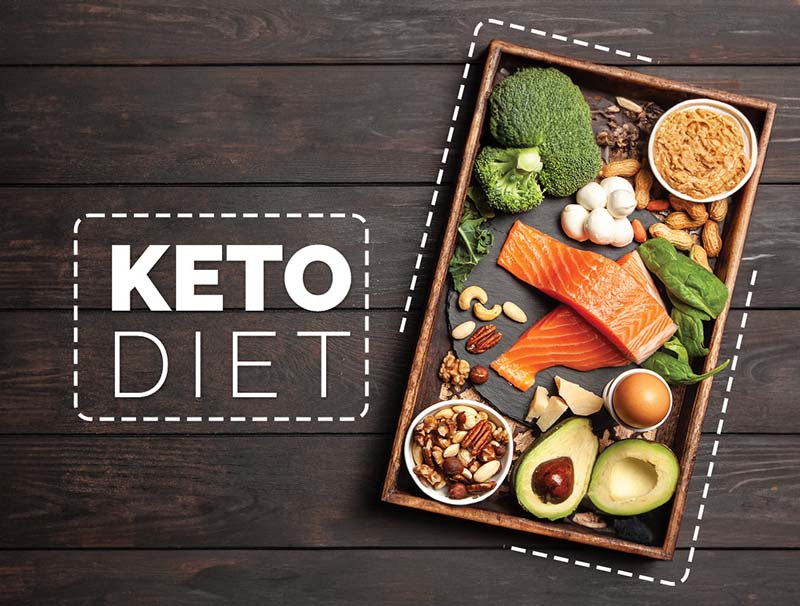
Despite various forms of the ketogenic diet, the core principle remains: drastically cutting down on carbs. Generally, the diet is composed of about 5% calories from carbs, 20% from proteins, and a whopping 75% from fats. For someone on a 2,000-calorie daily diet, this translates to roughly 25 grams of carbs, 100 grams of protein, and 167 grams of fat. Some ketogenic diets may allow up to 70 grams of carbs per day, but typically, 50 grams is the upper limit.
The goal of this diet is to induce nutritional ketosis, a state where the body, deprived of carbs, starts producing ketones. These ketones, generated in the liver, become the primary energy source, replacing glucose which is usually derived from carbs.
2. Basic Principles of the Keto Diet
The ketogenic diet is often considered a unique dietary approach because of its potential health benefits. Here is a breakdown of its key principles:
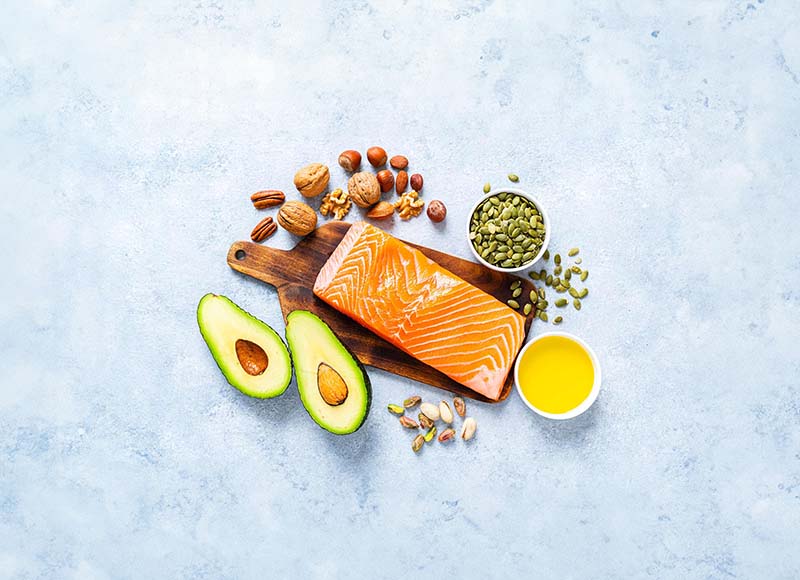
- Eat Very Few Carbs: The keto diet limits carbs to less than 50 grams per day, sometimes even as low as 20 grams. This is a big drop from the usual 200-300 grams recommended daily.
- High Fat Consumption: It suggests eating a lot of healthy fats, like avocados, nuts, seeds, olive oil, and fatty meats. Fats should make up about 70-80% of your daily calories.
- Moderate Protein: You should get about 15-20% of your calories from protein, which is a bit lower than the 10-15% in a typical diet.
- Very Low Sugar: Keep sugar under 20 grams per day. This means cutting out sugary drinks, desserts, and processed foods.
- Plenty of Fiber: Aim for 25-30 grams of fiber each day to help with digestion and feeling full.
- Focus on Nutrient-Rich Foods: Eat foods like vegetables, nuts, seeds, and healthy fats that are packed with vitamins, minerals, and antioxidants.
- No Processed Foods: These often have a lot of carbs, sugar, and unhealthy fats.
- Avoid Grains: Stay away from wheat, barley, rice, and corn as they’re high in carbs and can spike blood sugar, making it harder to enter ketosis.
- Skip Legumes: Foods like beans, lentils, and peanuts are high in carbs and can disrupt ketosis.
- Limit Dairy: While some dairy like cheese and heavy cream is okay in moderation, avoid high-lactose items like milk and ice cream.
- No Artificial Sweeteners: These can trigger cravings for sweets and make the diet harder to follow.
- Watch Alcohol Intake: Alcohol can mess with ketosis and lead to carb cravings.
- Eat Nutritious Snacks: Choose snacks like nuts, seeds, cheese, and meat to keep you in ketosis and curb hunger.
- Stay Hydrated: Drink plenty of water and low-carb drinks like tea and coffee to stay hydrated and help remove toxins.
- Track Your Progress: Keep an eye on your weight, measurements, and ketone levels in the blood to stay motivated and see the changes.
3. How Does the Keto Diet Work?
The ketogenic diet is a weight loss strategy that involves cutting back on carbohydrates, the primary energy source for the body’s cells, to shift the body’s energy source from glucose to ketones, which are derived from stored fat. This is why it’s called “ketogenic”. The brain, which is a heavy consumer of glucose, needs about 120 grams daily. It can’t store glucose, so the body has to supply it constantly.
When you fast or consume very few carbs, the body first uses glucose stored in the liver and even breaks down muscle temporarily for glucose. After about 3-4 days of this, if the stored glucose is all used up, insulin levels drop, and the body starts burning fat for fuel. This fat burning process in the liver creates ketone bodies, an alternative energy source that can be used when glucose is scarce.
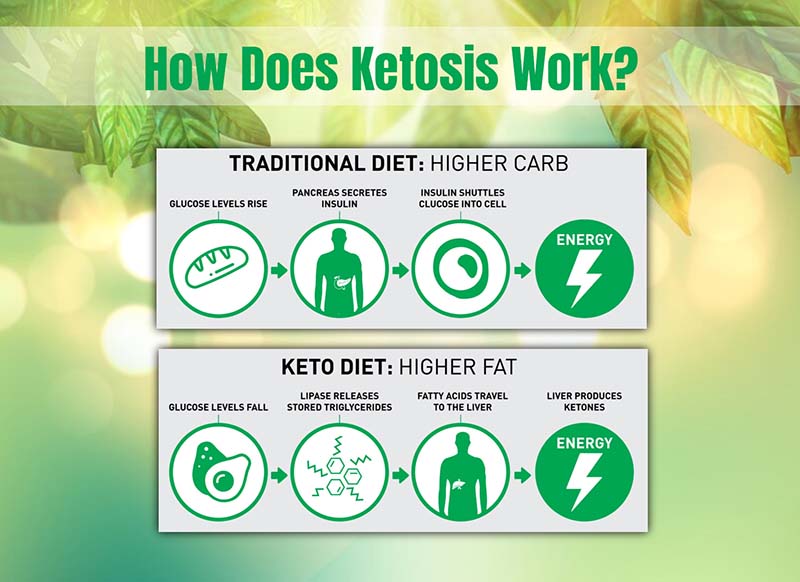
Ketosis is the state where ketone bodies are present in the blood. It’s a natural state that occurs during prolonged fasting like overnight sleep, or intense exercise. Advocates of the ketogenic diet argue that following the diet strictly keeps blood ketone levels safe, preventing ketoacidosis, a harmful condition. This is because the brain can use ketones for energy, and normally, enough insulin is produced to keep ketone levels in check. However, how quickly ketosis sets in and the amount of ketones produced varies among individuals, influenced by factors like body fat percentage and metabolic rate.
4. Can the Keto Diet Help Me Lose Weight?
The keto diet is a powerful tool for shedding pounds and improving overall health. Studies indicate that it’s just as good, if not better, for weight loss compared to low-fat diets. This diet’s big plus is that it’s so satisfying you might not need to count calories or keep a close eye on what you eat to lose weight.
Research shows that a keto diet, which is very low in carbs, tends to be more effective for long-term weight loss than a low-fat diet. On average, people on a keto diet lost about 2 pounds more than those on a low-fat diet.

But there’s more to it than just weight loss. The keto diet can also help lower your diastolic blood pressure (the lower number in a blood pressure reading) and triglyceride levels, which are a type of fat found in your blood.
In another study involving older adults, those on a keto diet for 8 weeks lost almost five times as much total body fat compared to those on a low-fat diet. Additionally, benefits like increased ketone levels, lower blood sugar, and better insulin sensitivity are key factors contributing to the health benefits of this diet.
5. Other Health Benefits of the Keto Diet
In addition to weight loss, the keto diet has other benefits such as:

5.1 Enhanced Regulation of Blood Sugar Levels
The keto diet can be great for controlling blood sugar, especially for people with diabetes or those close to developing it. For folks with type 2 diabetes, it’s been shown to help lower A1C levels. This is important because A1C is a check of blood sugar over time. A lower A1C means better control of diabetes. The keto diet might also make the body less resistant to insulin, a common problem in type 2 diabetes.
5.2 Boosting Brain Health
The keto diet can help with brain functions, especially for people with Alzheimer’s disease. Some studies found that it improved memory, focus, and mood in people with Alzheimer’s. It may also protect the brain from damage and even undo some damage caused by Alzheimer’s.
5.3 Lowering Heart Disease Risk
This diet can also cut down the risk of heart disease. It does this by lowering bad cholesterol and increasing good cholesterol. Plus, it reduces inflammation in the body. Since inflammation is a big cause of heart disease, lowering it by eating fewer carbs and more fat is helpful.
5.4 May Help Against Cancer
Another benefit of the keto diet is it might lower the risk of cancer. Some research shows it can slow down the growth of cancer cells and maybe even kill some. More studies are needed, but it could become a part of cancer treatment in the future.
5.5 Reducing Inflammation
Inflammation is how your body reacts to injury or infection. While some inflammation is good, too much can cause health issues like heart disease, arthritis, and diabetes. The keto diet can help reduce inflammation. Eating fewer carbs lowers sugars that cause inflammation, and eating more healthy fats, which are good at fighting inflammation, helps too.
5.6 Helping with Depression and Anxiety
Depression and anxiety are common mental health problems that can get worse with high-carb diets. The keto diet, which means eating fewer carbs and more healthy fats, may help ease symptoms of depression and anxiety. Studies have shown that it can improve mood, focus, and sleep for people with anxiety.
6. Is the Keto Diet Good for People with Diabetes and Prediabetes?
Diabetes means your body has trouble with handling sugar and using insulin right.
The keto diet can really help in losing extra body fat, which is super important because too much fat is often linked with type 2 diabetes, prediabetes, and something called metabolic syndrome. This syndrome raises the risk of heart problems and other health issues.
A study from a while back found that the keto diet greatly improved how well the body uses insulin by 75%. Better insulin use is key for controlling blood sugar.
In a smaller study with women who had type 2 diabetes, those who followed a keto diet for 90 days saw a big drop in their hemoglobin A1C levels. This is important because A1C is a measure of how well your blood sugar is managed over time.
Another study with 349 people with type 2 diabetes showed that those on a keto diet lost about 26.2 pounds over two years. Losing weight is really important for managing type 2 diabetes. Plus, these people also had better control over their blood sugar, and some needed less medication for their blood sugar as the study went on.
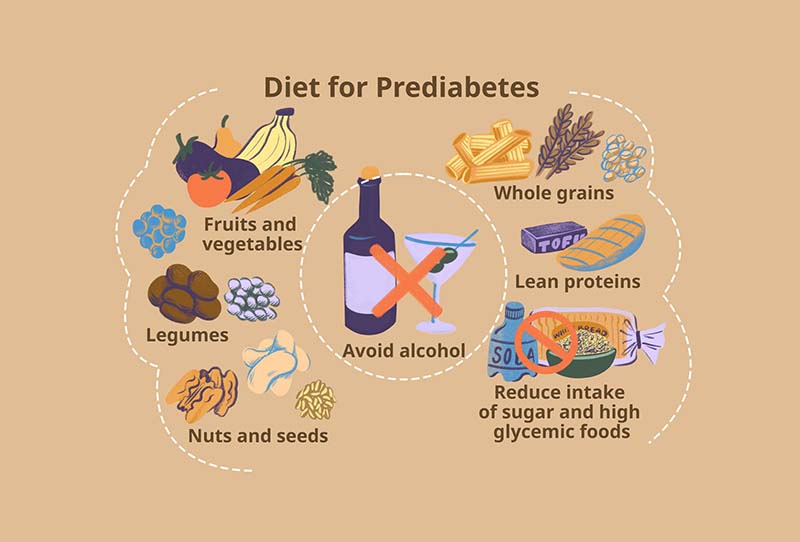
7. What Foods Are Allowed on a Ketogenic Diet?
When you’re on a keto diet, you get to enjoy a bunch of foods that are low in carbs but high in fat. Here’s a list of what you can eat:
- Fish and seafood: Think salmon, tuna, and shellfish. These are great for keto.
- Low-carb veggies: Go for broccoli, cauliflower, bell peppers, and zucchini.
- Cheese, avocados, and high-fat dairy products: These are keto-friendly and delicious.
- Poultry and eggs: They’re good sources of protein and fit well in the keto diet.
- Nuts, seeds, and nut butter: Perfect for a quick snack.
- Meat and pork: These are staples in the keto diet.
- Berries, but just a little: They’re sweet but still okay in moderation.
- Healthy oils: Olive oil and avocado oil are great choices for cooking and salads.

8. Foods to Avoid on the Keto Diet
When you’re following a keto diet, staying away from high-carb foods is crucial. These foods can disrupt ketosis and slow down your weight loss efforts. Here’s a list of foods to avoid:
- Grains: This includes rice, wheat, oats, and quinoa.
- Starchy vegetables: Potatoes, sweet potatoes, yams, and corn are off-limits.
- Legumes: Avoid beans, chickpeas, and lentils.
- Refined carbs: Steer clear of bread, pasta, and pastries.
- Sugary foods: Honey and syrups should be avoided.
- High-sugar fruits: Bananas and grapes are examples of fruits to skip.
- Some dairy products: Particularly low-fat milk and yogurt, which are higher in carbs.
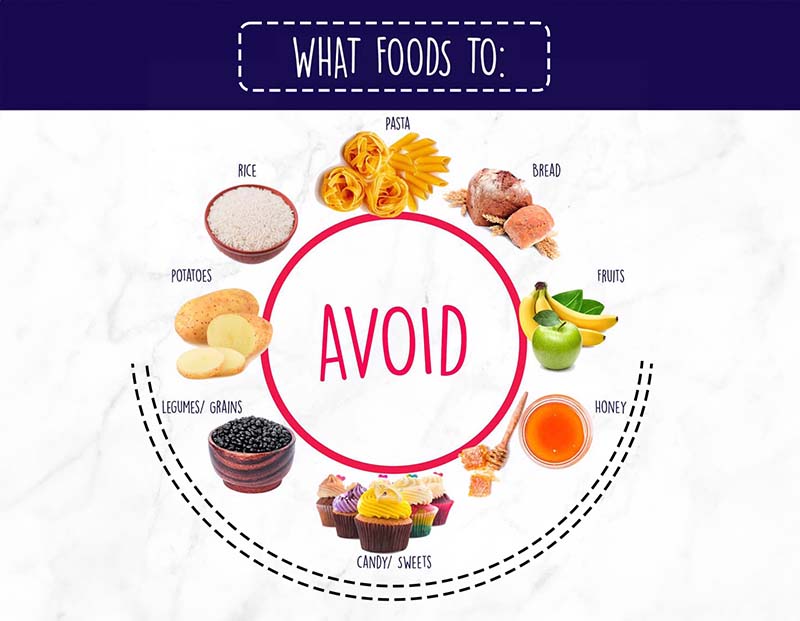
It’s also a good idea to limit certain veggies like onions, winter squash, and beets as they have more carbs. Instead, fill your plate with low-carb vegetables like broccoli, cauliflower, bell peppers, and zucchini.
9. A Sample Keto Diet Meal Plan for One Week
The 1 Week Keto Meal Plan is perfect for those new to the keto diet or seeking fresh meal ideas. This plan covers breakfast, lunch, dinner, and snacks for a full week and includes a handy shopping list and keto diet tips.
Day 1
- Breakfast: Scrambled eggs with bacon or sausage, cooked in butter
- Lunch: Tuna salad with mayo, hard-boiled eggs, and slices of cucumber
- Dinner: Chicken thighs fried in olive oil, served with broccoli and melted cheese
- Snacks: Handful of almonds, sticks of cheddar cheese, or celery sticks with peanut butter
Day 2
- Breakfast: Almond flour keto pancakes topped with butter
- Lunch: A BLT salad featuring romaine lettuce, crispy bacon, fresh tomatoes, and slices of avocado
- Dinner: Juicy grilled steak accompanied by sautéed mushrooms and onions
- Snacks: Crunchy baby carrots, pepperoni sticks, or low-carb peanut butter cups
Day 3
- Breakfast: Classic bacon and eggs
- Lunch: Turkey Club sandwich with bacon, lettuce, tomato, and mayo, using keto-friendly bread
- Dinner: Grilled salmon with tender asparagus and creamy hollandaise sauce
- Snacks: Parmesan cheese crisps, deli meat roll-ups, or classic deviled eggs
Day 4
- Breakfast: Hearty ham and cheese omelet
- Lunch: Filling Cobb salad with grilled chicken, bacon, avocado, and crumbled blue cheese
- Dinner: Succulent pork chops served with green beans and mashed cauliflower
- Snacks: Cucumber slices with ranch dressing, a variety of nuts, or a handful of berries
Day 5
- Breakfast: Savory breakfast sausage paired with eggs
- Lunch: Grilled chicken Caesar salad for a light yet satisfying meal
- Dinner: Tender beef roast with a side of carrots and celery
- Snacks: String cheese, a few olives, or homemade keto muffins
Day 6
- Breakfast: Fluffy omelet loaded with your favorite veggies
- Lunch: Homemade chicken salad with mayo and diced grapes
- Dinner: Roasted pork tenderloin alongside Brussels sprouts and sweet potatoes
- Snacks: Creamy cottage cheese, celery with peanut butter, or convenient keto bars
Day 7
- Breakfast: Simple 3-ingredient keto pancakes
- Lunch: Fresh shrimp salad mixed with avocado and cucumber
- Dinner: Flavorful chicken stir-fry with broccoli and cashews
- Snacks: Crispy Parmesan cheese crisps, deli meat roll-ups, or a couple of hard-boiled eggs
This meal plan is designed to be keto-friendly, focusing on low-carb, high-fat foods. Remember, portion control is still important, even on a keto diet. Drink plenty of water, and feel free to adjust the meals to suit your tastes and nutritional needs. Enjoy experimenting with these recipes and making them your own!
10. Are There Any Risks Associated with the Keto Diet?
When you change your diet significantly, like starting the keto diet, there are some risks to consider, especially if it’s not done right. Here are some potential risks:
- Dehydration: Because the keto diet has fewer water-rich fruits and veggies, it can lead to dehydration.
- Nutrient deficiencies: The keto diet might lack certain essential nutrients like calcium, magnesium, and vitamin D.
- Constipation: With lower fiber intake on this diet, constipation can be a problem.
- Low blood sugar: For some people, especially those with diabetes or other health issues, the diet can lead to low blood sugar.
- Effects on gut health: Some studies suggest that a high-fat diet might not be great for your gut health.
- Bone health concerns: The diet’s high protein content could increase the risk of kidney stones and might also affect bone health negatively.
- Heart health risks: There’s some research that indicates a high-fat diet might up the risk of heart disease.

It’s really important to know that you can minimize these risks with good planning, learning more about the diet, and talking to a healthcare professional. Make sure you’re getting enough fiber, vitamins, and minerals, and don’t forget to drink plenty of water.
11. Side Effects and How to Minimize Them
When starting the keto diet, you might experience some side effects. Here are ways to manage them:
Fatigue:
- Start the diet slowly to ease your body into it.
- Make sure you’re getting enough sleep.
- Eat more healthy fats like avocados, nuts, and seeds.
- Consider taking electrolyte supplements like magnesium and potassium.
Headaches:
- Drink lots of water to stay hydrated.
- Increase your salt intake a bit to keep your electrolytes balanced.
- Eat small, balanced meals regularly.
- You might also benefit from magnesium and potassium supplements.
Nausea:
- Gradually transition into the keto diet.
- Try to limit dairy and processed foods.
- Again, healthy fats are your friends here.
- Drink plenty of water.
Constipation:
- Eat fiber-rich veggies.
- Include healthy fats in your diet.
- Stay hydrated.
- Magnesium supplements can also help.
Diarrhea:
- Ease into the diet slowly.
- Cut down on dairy and processed foods.
- Incorporate healthy fats.
- Drink lots of water.
Bad Breath:
- Water is essential here, too.
- Eat more vegetables.
- Reduce your meat intake.
- Sugar-free breath fresheners can help.
Remember, everyone’s body reacts differently to diet changes, and adjusting to the keto diet might take some time. It’s crucial to pay attention to how your body feels and respond accordingly.
12. Conclusion
In conclusion, understanding “What Is the Keto Diet” is key to navigating this popular yet complex nutritional approach. We’ve explored the basics of the diet, its potential benefits, and how to manage common side effects to ensure a smoother transition. Your journey with the keto diet is unique, and we’d love to hear about your experiences and insights. Sharing your stories and feedback not only inspires others but also enriches our community’s knowledge.
For more informative and engaging content on various diets and health tips, don’t forget to explore our other blogs at DietHCG. Whether you’re just starting out or are a seasoned keto enthusiast, there’s always something new to discover and learn in the world of healthy living.
>>Related articles:
1. What Is The hCG Diet? Should You Try The hCG Diet?
2. Klinio Diet: Discover the Effective and Safe Weight Loss


